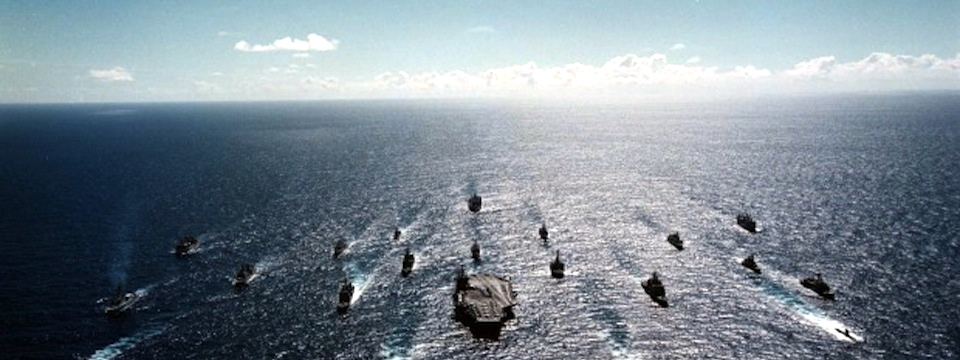“Governor Romney maybe hasn’t spent enough time looking at how our military works. You — you mentioned the Navy, for example, and that we have fewer ships than we did in 1916. Well, Governor, we also have fewer horses and bayonets — because the nature of our military’s changed. We have these things called aircraft carriers where planes land on them. We have these ships that go underwater, nuclear submarines.”
President Obama at the 3rd Presidential debate.
As opposed to the President, I have spent a lot of time looking at how our military looks. I served for over 31 years on active duty in the US Air Force and had many opportunities to learn about our sister services.
The one thing that the President got right is that our military has changed. One of the things that we learned after Viet Nam, and which we expect every generation of military leaders to learn is that the next war will not be like the last one. One of the prime failures that countries have made in the past has been to assume that the enemy we see tomorrow will be the same as the one we saw yesterday. New strategies, new tactics, and new tools are always being developed – because the most important responsibility of any government is protecting its citizens. We are constantly “trading up.”
The problem with the above statement is not whether it is factually correct or not (there are some postings that state that we actually have more bayonets issued today than in 1916). The problem is that the President does not seem to understand the impact of projected cuts on our readiness capability. He does not appreciate the interdependence of the fighting forces.
Most people do not consider the size of the Navy in the context of its responsibilities. While we constantly are shown images of our ground forces, people are seldom aware of the great portions of our planet which are patrolled by the Navy. They are responsible for protecting the lines of commerce around the world. Our sailors are also called to respond to disasters and heightened tensions wherever those may occur. When you see a ship afloat, you are looking at a slice of time. That crew is prepared for the mission ahead of them. But at the same time, there are additional sailors who are preparing to replace them when it is their turn.
As a comparison, consider a basketball team. Although only 5 players are on the court at one time, you must have many more as substitutes and replacements if you are to be able to play. In the case of the Navy, if you do not have the necessary ships and crews, you must inevitably limit the amount of the planet that you can protect.
Several years ago, I was on an education tour of Latin America with a group of senior military officers. One of our stops was Brazil which had just purchased an aircraft carrier from one of the European powers. The Brazilians were very proud of their impressive piece of military hardware. But amongst ourselves, our Navy members saw this purchase as folly. The Brazilians did not have the supporting ships and crews necessary to have an effective carrier battle group. In the words of one of our admirals, they had merely purchased a very expensive “target.” If our force is too small, we can chase the same folly.
Our Navy is the most important tool we have to “project” power around the world. When we send a fleet to Africa, Southeast Asia, or the Persian Gulf, we are making it known to all that we are there to maintain the peace, or, if necessary defeat our enemies. To do that we do not have to build bases or gain overflight permission. They stay in international waters and hold the power to reach out and do what is required in a conflict. They are also a great force for diplomacy as we saw when they responded to the tsunamis in recent years. There is just no other force in the world which can do what the US Navy can.
We must always prepare to respond to the conflicts that are before us. But while we are doing that, we must be able to deal with what is here and now. And, not surprisingly, there is ancient wisdom to consider when you think of the size of the Navy. Military officers study the works of a Chinese warrior who lived over 2500 years ago.
SunTzu once said,
“To win a hundred victories in a hundred battles is not the acme of skill. To defeat your opponent without a single battle – that is the acme of skill.”
We must have a military that no potential adversary would ever want to challenge. That is why we need a strong Navy.
*****************************************
Note from the editor: Spike72AFA is Maj Gen (Ret) Lee Rodgers










Another point made after the debate is that a smaller Navy will, by necessity, require longer deployments of its crews to extend across the same footprint the Navy currently patrols today, creating more demand and higher likelihood of burnout from the sailors. (Or, as you mentioned above, we’ll just reduce our footprint to our side of the lake, and let the folks on the other side fight it out.)
I write all this as a civilian, albeit one who has much experience with the uniformed services. Lee, your contribution, backed up by your USAF experience, is a strong rebuke to our president’s cavalier dismissal of a valid concern about military strength. Thanks for making it.
Great comments, George! And of course I concur: Lee’s article carries weight in the push-back to Obama’s non-sensical remarks.
It is great to see a defense of our fine military by someone who served in it. I am always grateful to those who serve their country. It is a shame and a disgrace that the sitting president of the United States up and dismisses the significance of the sequestration that he pushed and belittled the mission of the Navy at the same time.
There was also a glaring hypocrisy in his criticism of Governor Romney (aside from brazen lie). On one hand he claimed that we shouldn’t increase military spending because “no one is asking for it.” On the other hand, he summarily dismissed Governor Romney saying we should build more ships because the Navy asked for it. So we shouldn’t build up defense because they didn’t ask for it, but when they do ask for it, we still shouldn’t build up defense? That answer alone I believe cost him Virginia and overall, it didn’t do him any favors.
First, thank you for your service Maj Gen Rodgers!
Thank you for this great article setting the president straight. I loved your analogy of a basketball team.
Well done sir!! I salute you.
Thanks for the comments, Michael…Lee (Spike72AFA) deserves the credit! And to top it all off, he’s a Texan AND a Tribble!
I found it interestingly disturbing the Comander in Chief had rehearsed a gotcha joke line belittling our military. The law he signed has ship builders and support crews preparing for layoffs. Sad when you think about it. Bet his friend jon stewart liked it.
Exactly Chris! I was appalled at his condescending and cavalier attitude toward our troops, their bayonets and horses! Yes, they still use bayonets. Obama hasn’t an inkling about military preparedness and strategy.
Perhaps the president hasn’t spent enough time looking at how our military works? I would say “pot calling the kettle black”, but would then be labeled a racist!